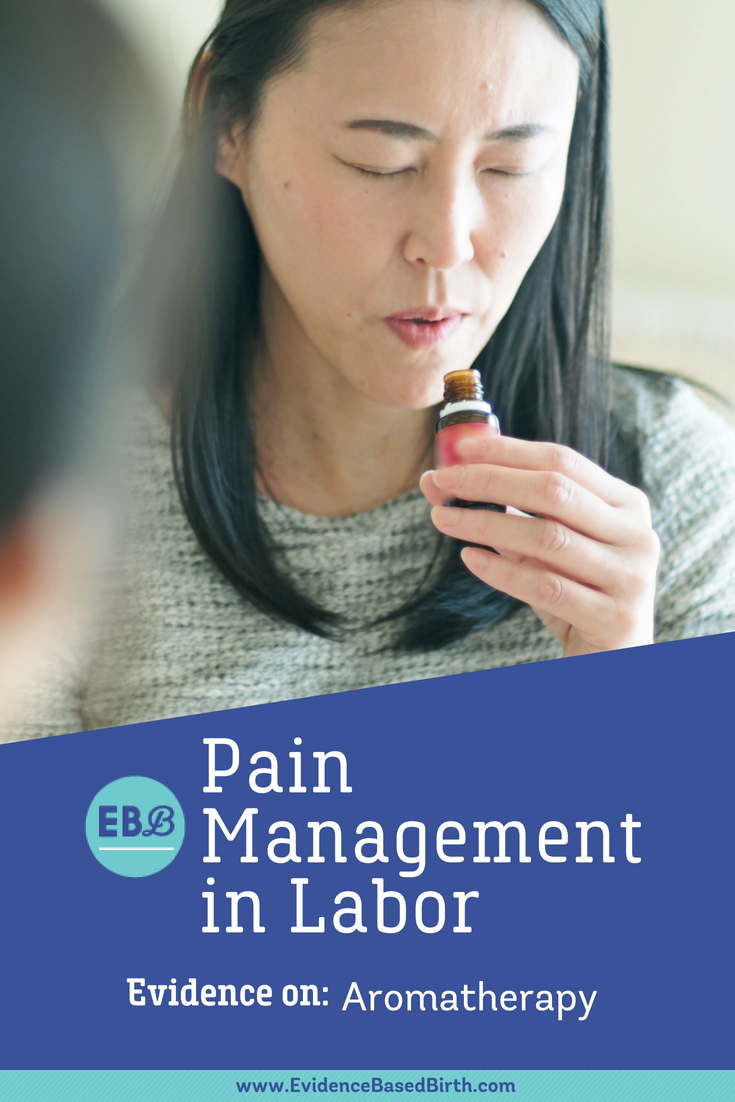Aromatherapy during Labor for Pain Relief

Welcome!
Today’s video is all about using aromatherapy during labor. As a reminder, here is our disclaimer and terms of use.
You’ll learn:
- What aromatherapy is
- How aromatherapy during labor might work to provide pain relief
- What the evidence shows about using aromatherapy during labor for pain relief
Resources
- Burns, E.E., Blamey, C., Ersser, S.J., et al. (2000) An investigation into the use of aromatherapy in intrapartum midwifery practice. J Altern Complement Med 6:141–147.
- Hamdamian, S., Nazarpour, S., Simbar, M., et al. (2018). Effects of aromatherapy with Rosa damascena on nulliparous women’s pain and anxiety of labor during first stage of labor. J Integr Med. Mar;16(2):120-125.
- Hekmatpou, D., Pourandish, Y., Farahani, P.V., et al. (2017). The Effect of Aromatherapy with the Essential Oil of Orange on Pain and Vital Signs of Patients with Fractured Limbs Admitted to the Emergency Ward: A Randomized Clinical Trial. Indian J Palliat Care. Oct-Dec;23(4):431-436.
- Johnson, K., West, T., Diana, S., et al. (2017). Use of aromatherapy to promote a therapeutic nurse environment. Intensive Crit Care Nurs. Jun;40:18-25. Click here.
- Kaviani, M., Maghbool, S., Azima, S., et al. (2014). Comparison of the effect of aromatherapy with Jasminum officinale and Salvia officinale on pain severity and labor outcome in nulliparous women. Iran J Nurs Midwifery Res. Nov;19(6):666-72.
- Kheirkhah, M., Vali Pour, N.S., Nisani, L., et al. (2014). Comparing the effects of aromatherapy with rose oils and warm foot bath on anxiety in the first stage of labor in nulliparous women. Iran Red Crescent Med J. Aug 17;16(9):e14455.
- Lakhan, S. E, Sheafer, H, & Tepper, D. (2016).“The Effectiveness of Aromatherapy in Reducing Pain: A Systematic Review and Meta-Analysis,” Pain Research and Treatment, vol. 2016, Article ID 8158693, 13 pages.
- Namazi, M., Amir Ali Akbari, S., Mojab, F., et al. (2014a). Effects of citrus aurantium (bitter orange) on the severity of first-stage labor pain. Iran J Pharm Res. Summer;13(3):1011-8.
- Namazi, M., Amir Ali Akbari, S., Mojab, F., et al. (2014b). Aromatherapy with citrus aurantium oil and anxiety during the first stage of labor. Iran Red Crescent Med J. Jun;16(6):e18371.
- Rashidi-Fakari, F., Tabatabaeichehr, M., Kamali, H., et al. (2015). Effect of Inhalation of Aroma of Geranium Essence on Anxiety and Physiological Parameters during First Stage of Labor in Nulliparous Women: a Randomized Clinical Trial. J Caring Sci. Jun 1;4(2):135-41.
- Rashidi-Fakari, F., Tabatabaeichehr, M., & Mortazavi H. (2015). The effect of aromatherapy by essential oil of orange on anxiety during labor: A randomized clinical trial. Iran J Nurs Midwifery Res. Nov-Dec;20(6):661-4.
- Smith, C.A., Collins, C.T., & Crowther, C.A. (2011). Aromatherapy for pain management in labour. Cochrane Database Syst Rev. Jul 6;(7):CD009215.
- Tanvisut, R., Traisrisilp, K., & Tongsong, T. (2018). Efficacy of aromatherapy for reducing pain during labor: a randomized controlled trial. Arch Gynecol Obstet. Feb 3.
- Yazdkhasti, M. and Pirak A. (2016). The effect of aromatherapy with lavender essence on severity of labor pain and duration of labor in primiparous women. Complement Ther Clin Pract. Nov;25:81-86.
View the transcript
Hi, everyone. In today’s video, we’re going to talk about the evidence on using aromatherapy during labor for pain relief.
My name is Rebecca Dekker and I’m a nurse with my PhD and the founder of Evidence Based Birth. We’ve recently been releasing a whole bunch of videos all about pain management during labor. Today, we’re going to cover aromatherapy during labor.
What is aromatherapy?
Aromatherapy is a traditional and historical practice of using essential oils from plants in order to enhance well-being. The essential oils are usually mixed with a carrier oil such as grape seed, sweet almond or sesame oil.
Essential oils may be massaged into the skin, given in a warm bath, or diffused into the air using a diffuser. Aromatherapy is considered a complementary therapy. That means it can be used alongside other medical practices. It can also be used on its own or with other non-drug methods as an alternative during labor to pain medications such as an epidural.
The use of complementary therapies has become very popular worldwide with half of all women of reproductive age stating that they use complementary therapies. The use of aromatherapy during labor is an affordable practice. In one study, they found that the cost of providing aromatherapy during labor would only cost about $500 to treat 3,000 women.
Aromatherapy could be used during labor to help manage pain, anxiety or to help someone sleep. Anxiety, fear and tension are linked to someone’s pain perception. So, often, how much pain you perceive is related to how much anxiety you feel. The purpose of using aromatherapy during labor would be to decrease pain and manage anxiety and also to create a greater satisfaction with the childbirth experience. If you haven’t already, I highly encouraged you to watch our video all about painless birth and all the different factors that go into how we perceive pain during labor.
How might aromatherapy work to relieve pain?
Well, the truth is we don’t really know exactly how aromatherapy works. Researchers think that aromatherapy might work by exposing the limbic system in your brain to molecules that stimulate that system. The limbic system is the part of the brain that’s responsible for emotions and memories. By stimulating that part of the brain, it’s thought that the aromatherapy may decrease anxiety and tension which would then lead to a decrease in pain perception.
It might also work by decreasing cortisol which is a stress hormone or by increasing serotonin which is a messenger between nerve cells. In other words, essential oils might work by increasing the output of your body’s own natural stress-relieving substances.
Essential oils have actually been a part of nursing practice. Florence Nightingale, the founder of modern nursing, used essential lavender oil on wounded soldiers during the Crimean War in the 1850s.
What are the potential harms or risks of using aromatherapy?
There have been no studies or case reports published in research that have found any harm from using essential oils during labor.
However, essential oils are highly concentrated substances and have the potential to cause skin irritation and allergic reactions. Frequently, a patch test is done on the skin to check for allergies before administering more of the essential oil.
One large study followed more than 8,000 mothers at a British hospital in the 1990s. All of the women gave informed consent to use aromatherapy during labor. Of the participants, 60% were first-time mothers and about one out of three were having their labors induced. Researchers compared their outcomes with roughly 16,000 mothers who did not use aromatherapy on that unit during the same time period.
They found that more than 50% of the mothers rated the use of aromatherapy as helpful during labor and 13% said that it was unhelpful. 10 different oils were used in consultation with an aromatherapist. The mothers rated rose essential oil as the most helpful overall and peppermint oil as being the most helpful with nausea and vomiting. Overall, only 1% of the mothers reported undesired effects from aromatherapy during labor. The symptoms that they described are consistent with what other people may normally experience during labor, so it’s hard to tell if these effects were due to the essential oils or if they were just a normal part of labor. The symptoms included nausea and itchy rash, headache and fast labor. None of the reports were linked to a bad health outcome for the mothers or babies.
What does the evidence say about the use of aromatherapy during labor on pain and anxiety?
Well, the most recent Cochrane review on this topic is outdated. It was published in 2011 and only covered two studies with a total of about 500 participants. We did our own literature review and found eight recent randomized controlled trials comparing essential oils to placebo or nothing.
Types of essential oils in the studies
One study let people choose from four different essential oil options. Two studies examined the effects of rose essential oil, and the others looked at lavender, citrus, geranium, sweet orange peel, jasmine, Salvia officinalis, and bitter orange. Seven of these eight studies took place in Iran and the study that let women choose from four different oils was published in Thailand.
Study participants
The participants in all seven Iranian studies did not use any pain medications during labor so they were having unmedicated births. Most of the women in the Thailand study were using Demerol for pain relief but none of the women had epidurals. All of these studies only included low risk, healthy mothers. All of the studies used control groups and seven of the eight studies included control groups that had a placebo. The placebo was usually normal saline or distilled water. The study from Thailand was the only one that did not use a placebo with the control group.
The intervention
The studies all used different methods to apply the aromatherapy or placebo. Most applied it to a piece of gauze or a napkin that was attached to the mother’s clothing. They would add new drops of essential oil to that piece of gauze at different points during labor. One study used an incense mask that was held about 20 centimeters away from the participant’s face. One massaged the oil into the woman’s palm. One provided a warm foot bath with essential oils in it, and another diffused essential oil into the air.
Outcomes
Three studies looked at pain levels, three studies looked at anxiety levels, and two studies looked at both pain and anxiety. All five of the studies that looked at the effects of aromatherapy on pain found lower pain scores in the aromatherapy group compared to the placebo group. One study found that the aromatherapy made no difference in the late active phase (getting towards the end of labor). However, despite the difference in pain scores, pain scores remained high in both groups.
On a scale from 0 to 10 with 0 being no pain and 10 being the worst pain possible, pain scores at the end of labor when women were about 8 to 10 centimeters dilated averaged 6.7 to 7.9 among women in the aromatherapy group and 9.4 to 9.8 among people receiving a placebo. We will post the names of the essential oils that were linked with lower pain scores in these studies.
All five of the studies that looked at anxiety scores also found lower levels of anxiety among people who were randomly assigned to receive aromatherapy compared to placebo or control. I’ll also post the names of the essential oils that were found to be helpful for decreasing anxiety.
Interestingly, four of the five studies that looked at anxiety found that anxiety levels went down in both the aromatherapy groups and the placebo groups. However, the decrease in anxiety was greater in the aromatherapy groups. Researchers think that women who received the placebo also had a beneficial effect from the time and attention that the researchers paid to them while they were receiving the placebo. In other words, both groups probably felt a feeling of reassurance and they both felt that they were being supported due to the attention given in providing both the aromatherapy and also the placebo.
In addition to lowering pain and anxiety, researchers also found that aromatherapy may help shorten labor (seen with Salvia officinalis aromatherapy) and decrease diastolic blood pressure (seen with geranium essential oil therapy).
Effects of aromatherapy on nursing staff
Sometimes, I wonder as a nurse what effects using aromatherapy may have on the nursing staff in the room. Well, there have been at least five studies looking at the use of essential oils in hospitals to help lower the stress level of nurses.
In one study published in 2017, researchers in Arizona surveyed 134 registered nurses who worked in critical care units. They asked them about their workplace-related stress. After they collected the surveys, they designated one area of the nursing unit to diffuse lavender essential oil into the air. Nurses could avoid that area if they wished. The lavender oil was actually being diffused 24 hours a day for a month-long period.
The researchers found in post surveys (when they surveyed everyone after that period), that nurses reported a lower rate of workplace-related stress after the intervention. These findings are consistent with other researchers who have found that the use of lavender essential oil may decrease the stress of nurses working in hospitals.
In summary
We have at least eight randomized controlled trials that looked at specific essential oils and they found that essential oils that were used in these studies did decrease pain and anxiety among people who were having unmedicated births. Using essential oils to help manage labor pain is affordable, noninvasive and does not have any documented cases of harm. It may not be appropriate for people with breathing problems or who have allergies to certain plants.
If you’re interested in this option, I would encourage you to seek out a professional aromatherapist who can help you with this. Choosing a fragrance that is personally appealing, or appealing to you as an individual, may have even more beneficial effects since the molecules in the essential oils are thought to stimulate parts of the brain responsible for emotion, memory and your response to pain.
According to the studies that we reviewed, the following essential oils may be especially helpful during labor:
- Lower pain scores: Lavender, Citrus, Jasmine, Salvia (Salvia officinale), Bitter Orange (Citrus aurantium), Rose (Rosa centifolia), Geranium Rose, and Rose Plant (Rosa damascena)
- Reduced stress/anxiety: Rose Plant (Rosa damascena), Geranium (Pelargonium graveolens), Sweet Orange Peel (Citrus sinesis), Bitter Orange (Citrus aurantium), and Lavender
- Decreased length of labor: Salvia (Salvia officinale)
- Decreased diastolic blood pressure: Geranium (Pelargonium graveolens)
- Decreased nausea and vomiting: Peppermint
That’s it for this video. I hope you found this information helpful. Please feel free to check out our other videos in this pain management series. Thanks for watching. Bye!






Stay empowered, read more :
EBB 310 – Doulas & Nurses Advocating Together for Positive Shifts in Birth Culture with Joyce Dykema, EBB Instructor & Brianna Fields, RN
Don't miss an episode! Subscribe to our podcast and leave a review! iTunes | Spotify | YouTube Dr. Rebecca Dekker is joined by Joyce Dykema, doula and EBB Instructor, and Brianna Fields, a labor and delivery nurse, to discuss advocating for positive shifts in...
EBB 308 – The Intersection of Environmental Justice and Midwifery Care with Dr. Tanya Khemet Taiwo
Don't miss an episode! Subscribe to our podcast and leave a review! iTunes | Spotify | YouTube Curious which toxins should be most avoided for people of reproductive age and their children? In this episode, Dr. Tanya Khemet Taiwo, LM, CPM, MPH, PhD unravels the...
EBB 307 – Unexplained Infertility, Endometriosis, and a Birth Center Birth Story with Ellora La Shier, EBB Childbirth Class Graduate
Don't miss an episode! Subscribe to our podcast and leave a review! iTunes | Spotify | GoogleIn this episode, Ellora La Shier, graduate of the EBB Childbirth Class, shares about her struggle with six years of unexplained infertility and how it impacted her...



